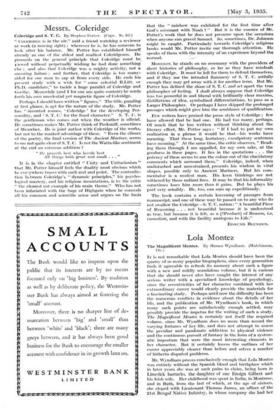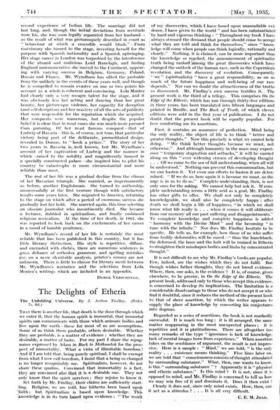Lola Montez
I* is not remarkable that Lola Montez should have been the quarry of so many popular biographers, since every generation finds it agreeable to refresh its memory about such a figure with a new and mildly scandalous volume, but it is curious that she should never also have caught the interest of any serious writer with a specialized knowledge of psychology, since the eccentricities of her character combined with her extraordinary career would clearly provide the materials for a fascinating study. Perhaps until now the difficulty has been the numerous conflicts in evidence about the details of her life, and the publication of Mr: Wyndham's book, in which many such points are satisfactorily enough settled, may possibly provide the impetus for the writing of such a study. The Magnificent Montez is certainly not itself the required
volume, since Mr. Wyndham does no more than record the varying fortunes of her life, and does not attempt to assess the peculiar and passionate addiction to physical violence
and the continuous pursuit of fantasy in the form of a system- atic imposture that were the most interesting elements in
her character. But it certainly leaves the outlines of her career appreciably clearer than before and solves a number of hitherto disputed problems.
Mr. Wyndham proves conclusively enough that Lola Montez was entirely without the Spanish blood and birthplace which in later years she was at such pains to claim, being born in
Limerick barracks, the daughter of one Ensign Gilbert and his Irish wife. Her childhood was spent in India, in Montrose, and in Bath, from the last of which, at the age of sixteen, she eloped with Lieutenant Thomas James, an officer of the 21st bengal 'Naive Infantry, in whose company she had her
second experience of Indian life. The marriage did not last long, and, though the initial deviations from rectitude Were his, she was soon legally separated front her husband— as the result of what was picturesquely described in court as " behaviour at which a crocodile would blush." - From matrimony she turned to the stage, investing herself for the purpose with Spanish nationality and a Spanish upbringing. Her stage career in London was torpedoed by the interference of the absurd and malicious Loid Ranelagh, and finding England unremunerative shemoved to the Continent, appear- ing with varying success in Belgium, Germany, Poland, Russia and France. Mr. Wyndham has sifted the probable from the unlikely in the events of these years well, and though he is compelled to remain evasive on one or two points -his account as a whole is coherent and convincing. Lola Montez had clearly only a very meagre talent for the stage, and it was obviously less her acting and dancing than her great beauty, her picturesque violence, her capacity for deception (and self-deception) and her mastery of all the arts of publicity that were responsible for the reputation which she acquired. Her conquests were numerous, but . despite the popular belief it is clear that in most cases she was much more pursued than pursuing. Of her must famous conquest—that ' of Ludwig of Bavaria—this is, of course, not true, that particular victory being part of the deliberate, premeditated design, revealed to. Dumas, to "hook .a prince."' The story of her two years in Bavaria is„,well known, but Mr. l'Vyndham's account of her captivation of Ludwig and the manner in which—raised to the nobility and magnificently housed in a specially constructed palace—she inspired him to pilot his country to catastrophe is more circumstantial and more reliable than most.
The rest of her life was a gradual decline from the climax of her Bavarian triumph. She married, as impermanently as before, another Englishmin. She turned to authorship. unsuccessfully at the first venture though with satisfactory results some years later. She migrated to America, returning to the stage on which after a period of enormous success she gradually lost her hold. She married again, this time selecting an obscure journalist who incontinently died. She became a lecturer, dabbled in spiritualism, and finally embraced religious revivalism. At the time of her death, in 1861, she was reported to look back on the excitements of her career in a mood of humble penitence. - Mr. Wyndham's record of her life is certainly the most reliable that has been published in this .country, but it has little literary distinction. His style is repetitive, diffuse. and encrusted with clichés, there are numerous sentences in gross defiance of orthodoic grammar, and spelling mistakes (or, on a more charitable analysis, printer's errors) are not unknown. There little to choose for literary merit between • Mr. Wyndham's narrative and the selections from Lola Montez's writings which are included in an appendix.
DEREK VERSCHOYLE.















































 Previous page
Previous page